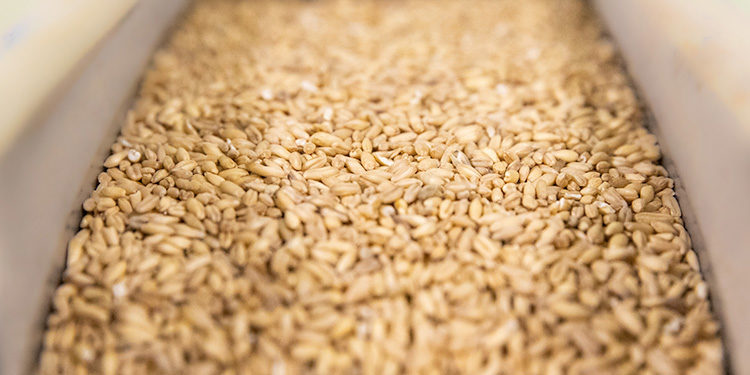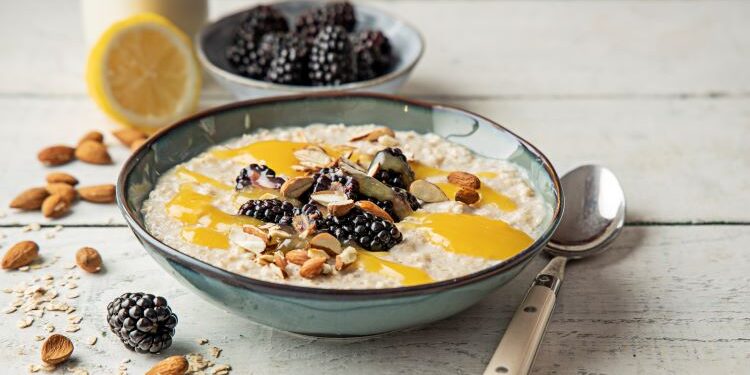FAQ’s - All About Oats

Is oatmeal good for you? Are oats healthy?
- Oatmeal has long been championed as a healthy and nutritious way to start your day. There are many reasons why oats are an excellent start to your day. Oats are a complex carbohydrate which slowly break down and are absorbed into your body. Starting your day with a bowl of oatmeal provides you with lasting energy to help you take on anything.
- Oatmeal made on water is a mix of carbohydrates, protein and fibre and contains no salt or sugar. Oats also contain magnesium, iron, zinc, thiamine, phosphorus as well as B vitamins.
Does oatmeal reduce cholesterol?
- There has been a wealth of studies to understand the benefits that oats and oat bran can have in lowering your blood cholesterol. This is due to the power of the soluble fibre, beta-glucan, which reduces the low-density lipoprotein (LDL), the ‘bad’ cholesterol in your blood, by binding to it in your gut and stopping it from reaching your bloodstream.
- Three grams of beta-glucan daily* can assist in lowering your LDL with studies suggesting by between 5%-10%. One 40g serving of Flahavan’s contains at least 1 gram of this beneficial fibre. *as part of a diet low in saturated fatand a healthy lifestyle may help reduce the risk of heart disease.
What time of the day should I eat oats?
- The benefits of a bowl of oatmeal can be experienced at any time of the day or night. Oats are a deliciously healthy ingredient, not just in oatmeal but also in cooking and baking. Have a look at our recipes pages to see the breads, snacks, sweet and savoury treats which can be made using this super ingredient.
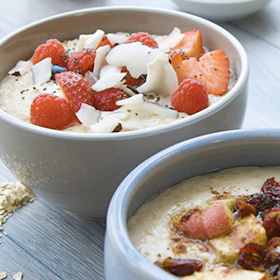 How many calories in a bowl of oatmeal
How many calories in a bowl of oatmeal
- Depending on how much toppings you like to add the calories in the bowl will differ. A 40g serving of Flahavan’s oats made on water, with nothing added, contain approximately 148 calories. If you make it with milk the calories, but also the calcium, protein and mineral content increases. A 40g serving of oatmeal made with semi skimmed milk contains approximately 250 calories.
Is oatmeal gluten free?
- Oats are naturally gluten free, however during the farming, harvesting and transportation processes oats can easily become contaminated. When farmers engage in crop rotation, wheat, barley and rye, all containing gluten, might be grown in the same field as oats. Also, oats might be transported in the same trailers which had previously been used to transport other grains. Flahavan’s do not process any gluten-containing grains, so any contamination occurs prior to oats being delivered to our mill.
Are oats suitable for Coeliacs?
- Until recently, the position of The Coeliac Society has been to recommend excluding oats from the gluten free diet, primarily because it had been almost impossible to source uncontaminated oats. Now that is not an issue, however a small amount of coeliacs will still react to them. If you decide to use uncontaminated oats, you should do so under medical instruction and supervision.
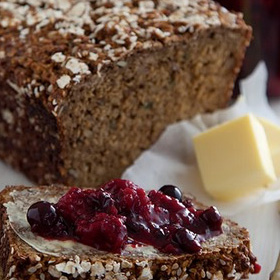 How do you make oatmeal bread?
How do you make oatmeal bread?
- Oatmeal bread is a deliciously healthy bread recipe which contains only 3 ingredients. Click here to try Flahavan’s porridge bread recipe »
Is oatmeal fattening?
- Starting your day with a bowl of Flahavan’s oats kicks starts your metabolism and you are less likely to snack mid-morning and less likely to eat past the point of fullness at lunch. Eating oatmeal every morning has other health benefits. It boosts energy, can help lower cholesterol (as part of a varied, balanced diet), may help prevent heart disease, helps control blood sugars and aids digestion.
What is the healthiest breakfast I can have?
- A healthy breakfast is one that contains nutritious foods that provide energy and make a person feel full, which can help prevent overeating later in the day. Oatmeal with fruit, nuts and/or seeds can help fulfil this need.
Is oatmeal a good breakfast for kids?
- Studies have shown the importance of breakfast for children, but what they eat for breakfast is crucial too. Kids who eat a healthy breakfast tend to eat healthier food for the rest of the day. We understand that giving your kids the best start and keeping them healthy is important to every parent. Kicking off the day with a healthy whole grain oaty breakfast can aid with concentration, attention span and memory.
- Children who eat a whole grain breakfast also tend to keep their weight under control.
 Is it good for me to eat breakfast?
Is it good for me to eat breakfast?
- The pros and cons of eating breakfast has been a hot topic of conversation recently – from intermittent fasting, to eating high protein or wholegrain breakfast, the debate about the best way to start your day is continuous. A spokesperson for the British Dietetic Association and specialist dietitian, Marcela Fuiza, stated that ‘Research has shown that people who eat breakfast lose weight more successfully, and keep it off, and have a reduced risk of certain diseases such as diabetes and heart disease’. However, what is most important is what you eat for breakfast, we recommend choosing a balanced breakfast that gives your body the best nourishment. Try to include a source of protein, healthy fats and of course whole grain oats. This could include oats with fruit and nut butter, oats with Greek yogurt, berries and nuts, or if you’re feeling adventurous try topping your oats with an avocado and poached egg. Click here for some recipes which will give you the best start to your day.
About Oats:
What’s Good About Oats?
Helps Lower Cholesterol
- Oats are high in soluble fibre. Beta-Glucan, the water-soluble fibre prevalent in oats has been shown to reduce blood cholesterol. High cholesterol is a risk factor in the development of coronary heart disease.
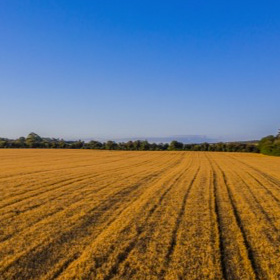 Slowly Releases Energy
Slowly Releases Energy
- Oats are high in complex carbohydrates and fibre, which means they release energy slowly. A bowl of oatmeal can help provide all the energy you need until lunchtime.
Helps With Weight Management
- One of the benefits of eating oats is that your stomach stays fuller for longer, providing satiety. Soluble fibre also slows the absorption of glucose into the body, which means you are going to reduce the effects of high and low sugar peaks.
Helps Concentration
- The slow releasing complex carbohydrates in oats sustain energy levels, allowing full concentration levels to be maintained.
Helps With The Management Of Diabetes
- Eating plenty of fibre, 20g to 35g a day, can help to control your blood sugar, which is especially important if you have diabetes. The fibre in oats can keep your blood sugar from rising too quickly after you eat.
Promotes Well-Being
- Porridge is high in Vitamin B1 (Thiamin) which takes part in many of the chemical reactions in the body which contribute to normal functioning of the nervous system and the heart.
 Offers Value For Money
Offers Value For Money
- Oats are one of nature’s finest natural foods that not only taste good but also offer great value for money.
Why are oats so healthy?
- Oats have long been championed as a healthy and nutritious way to start your day, but also a great whole grain substitute for wheat flour in baking. Oats are one of the most versatile ingredients as they can be incorporated into tasty on the go snacks, sweet treats and nourishing oatmeal. There are many reasons why oats are an excellent start to your day. Oats are a nutritionally dense complex carbohydrate which slowly break down and are absorbed into your body. Starting your day with a bowl of oatmeal provides you with lasting energy to help you take on anything.
- Oatmeal made on water is a mix of carbohydrates, protein and fibre and contains no salt or sugar. Oats also contain magnesium, iron, zinc, thiamine, phosphorus as well as B vitamins. List what each of these are good for:
- Magnesium: Important for bone formation, calcium absorption, diabetes, Heart health.
- Iron: 1 serving of oats contains around 3.4mg of iron – 19% of RDI. Iron can help to reduce fatigue, boost immunity, boost haemoglobin, improve concentration and treat anemia
- Zinc: Because your body does not naturally produce zinc, you must obtain it through food or supplements. Zinc is required for immune function, wound healing, growth and development.
- Thiamine (Vitamin B1): Enables the body to convert carbohydrates, fats and protein into energy. It is important for glucose metabolism, and it plays a key role in nerve, muscle and heart function.
- Phosphorus: Phosphorus works with calcium to help build bones
- B Vitamins: Play an important role in your metabolism and collectively they help your body metabolism fats, proteins, carbohydrates and nucleic acids. Some B vitamins, including vitamin B-6, play a role in nerve communication in your brain. Oatmeal provides a source of vitamins B-1, B-2, B-3, B-6 and B-9.
- Manganese: Essential for bone health and supports bones mineral density
- As well as providing slow release energy and keeping you fuller for longer, there has been a wealth of studies to understand the benefits that oats and oat bran can have in lowering your blood cholesterol. This is due to the power of the soluble fibre, beta-glucan, which reduces the low-density lipoprotein (LDL), the ‘bad’ cholesterol in your blood, by binding to it in your gut and stopping it from reaching your bloodstream.
Are oats high in fibre?
- Oats are a great source of fibre. One cup of Flahavan’s oats (40g) will provide you with 3.3 grams of fiber. Oats contain a combination of insoluble and soluble fiber, and are unique as they contain the powerful soluble fibre beta-glucan which helps to lower cholesterol, reduce blood sugar levels, promotes healthy gut bacteria, and increases feelings of fullness and decrease the risk of diabetes, as part of a healthy diet.
 Can oats cause bloating/ IBS?
Can oats cause bloating/ IBS?
- Fibre is hugely important in your diet to keep things moving and keep you regular. Every time you eat a bowl of oatmeal – you are fuelling your body with the fibre it needs to keep things moving through your colon and intestines. Oats have a high concentration of insoluble fibre which can promote digestive system health. To support this healthy digestive system, some experts recommend eating a least 25-30 grams of fibre daily from a variety of grains, fruits and vegetables. It may cause bloating in sensitive individuals but this needs to be confirmed by a medical specialist.
Can you use oats instead of flour? How to make oat flour?
- Oats are a great replacement for flour in certain cooking and baking as they are higher in fibre and protein than other grains. Oat flour is nutritionally dense and provides slow release energy. To make oat flour you simply need to blend your oats in a food processor or Nutribullet until they are finely ground. Oat flour is best used in baked good that don’t need to rise e.g. breads, cookies, muffins and in savoury products like pancakes.
Are oats good for your skin?
- Oats for great for your skin, especially in treating inflammatory conditions – oats are excellent at alleviating itching caused by eczema, dermatitis and skin rashes.
Overnight Oats:
How to make overnight oats?
- All oat fans have to do is add milk, apple juice or water to the ready-mix the night before, pop it in the fridge and then enjoy it delightfully textured and chilled the following morning at home or take it to the office in sealed container to enjoy at work.
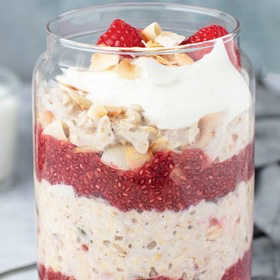 Should Overnight oats be eaten cold?
Should Overnight oats be eaten cold?
- Overnight Oats can be eaten hot or cold but for a handy on the go breakfast which can be eaten straight after the gym, or at your desk cold Overnight Oats mean no need to find a microwave!
Are Overnight oats healthy?
- Overnight Oats are not just handy but healthy too. They are high in fiber, a source of protein and deliciously creamy, Overnight Oats’ slow release energy will keep even the busiest of bees buzzing until lunchtime!
Can overnight oats reduce cholesterol?
- Because Overnight Oats have a high percentage of oats eating them for breakfast every morning can help reduce cholesterol. The oats in Overnight Oats contain Beta Glucan, the soluble fibre which reduces the low-density lipoprotein (LDL), the ‘bad’ cholesterol in your blood, by binding to it in your gut and stopping it from reaching your bloodstream.
Beta Glucan:
How much beta glucan in oats?
- Three grams of beta-glucan daily* can assist in lowering your LDL (low-density lipoprotein, the ‘bad cholesterol’). One 40g serving of Flahavan’s contains at least 1 gram of this beneficial fibre.
*as part of a diet low in saturated fatand a healthy lifestyle may help reduce the risk of heart disease.
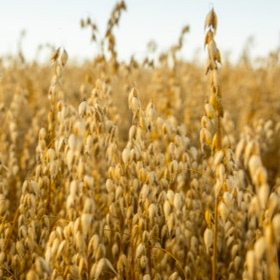 What does Beta Glucan do? What is Beta Glucan good for?
What does Beta Glucan do? What is Beta Glucan good for?
- There has been an array of studies to understand the benefits that oats and oat bran can have in lowering your blood cholesterol. This is due to the power of the soluble fibre, beta-glucan, which reduces the low-density lipoprotein (LDL), the ‘bad’ cholesterol in your blood, by binding to it in your gut and stopping it from reaching your bloodstream.
How much beta glucan should I have every day?
- Three grams of beta-glucan daily* can assist in lowering your LDL
*as part of a diet low in saturated fat and a healthy lifestyle may help reduce the risk of heart disease
How much beta glucan in a bowl of oatmeal?
- One 40g serving of Flahavan’s contains at least 1 gram of this beneficial fibre.


